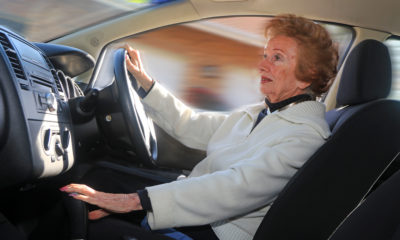
Lifestyle

A melting pot of bad drivers
My wife, Naami, and I were last week summoned to a school in the slapdash city of Hadera to be re-educated on how to drive. This happens in Israel. If you get caught performing a driving misdemeanour, no matter how minor, you lose points. There aren’t that many points to begin with, so if you misbehave behind the wheel, you find them disappearing like popcorn on movie night.
After one decade living in Joburg, both of us were at a distinct disadvantage. I remember my first interaction with an Israeli traffic cop. He had pulled me over for doing the thing you should never do, no matter how quiet the street or how slow the car is going, or how important the message. You know the thing. We all do it. Well, here, you shouldn’t.
Coming out of nowhere, he released one blast of his siren, and all my triggers leapt into action. Scanning the car for spare cash, checking my pockets for my driver’s license, putting my coffee down (which was in my other hand – I rely heavily on the miracle of luck while on the road), wiping the breakfast from my chin, trying to fix my hair. He was at my door in seconds, like some blue-uniformed ninja. Squinting up at him, his head shading my eyes from the sun, I noticed how strange it was that he seemed so tidied up, so ready for business, so fit, so … professional. I knew I was caught off guard, but I also knew that I had to let him know my position up front so we could quickly settle our arrangement.
“Cold … drink?” I asked him, leadingly.
“What are you talking about? Driver’s license, please.” I handed it up to him, muttering under my breath how usually well behaved I was, patently lying to myself, then grumbling further that the truth was that maybe I did very occasionally check my phone to find my music playlists because music did keep me awake while driving, so it was ultimately for my safety and the safety of others. Then I noticed him staring down at me with a concerned look.
“Are you OK, mister?” He asked.
“Yes! Yes, I’m fine. Can you forgive me? I’m new here and …”
“One thousand shekel fine. Don’t do it again.” With that, he handed me a slip of paper and walked back to his cruiser.
And now, to add insult to that staggering financial injury of so many months back (R4 400 for texting “love you too, ma”), we were called up to this high school in Hadera at 17:00 on Tuesday, which would result in eight hours of classes over two evenings. Eight classroom hours! I hadn’t spent that much time in a class since primary school. I could taste the panic.
Hadera isn’t the Israel I made aliyah to. Zichron Yaakov, the bougie quaint town in the hills above the Mediterranean, brimming with middle-class Anglos from across the English-speaking world, is more my scene. Just 15 minutes apart by road – if you drive at the speed limit – but 15 light years apart in demographics and worldview, Hadera is the raw cross-section of Israel in its current incarnation.
It was into this classroom, and into this country, that Naami and I entered, and over the next two days, I was unceremoniously inducted into the hardboiled multiplicity that is the true state of Israel. Naami, a Jerusalemite, acted as my guide, and by picking up the dialects, nuances, and fashions, whispered quietly to me who was who and from where they came.
One thing was certain: we were all bonded together in this room because we shared the singular common condition of how badly we drove. The comradery was hard to hide – we were the naughty kids. From the front of the class to the back, from the cool cat with peyot and peak cap to the shaved bald Russian gangster, from the Arab siblings seated next to each other comparing notes to the Armenian fashionista, the Ethiopian intellectual to the Litvish nerd, and all of us being quietly observed by the R&B babe attending to her nails in the corner. We were here to get legal again, and apparently have some fun doing it.
The first thing that struck me was the presence and attitude of the instructor, who was about to steer this motley crew through the rules of the road. I instinctively felt bad for him until he addressed the room. Here was a born educator.
We all remember that one teacher who was simply made to impart knowledge, to distil complexity, to guide, and inspire. It was suddenly clear that we had in our midst a tried and tested tutor of the most refined order. The traffic department seeks out teachers to do this work outside of their normal hours, and this man had clearly done his time.
He started by deftly juggling both a stick and a carrot in front of us. If we check our phones while in class, he will kick us out, and we will have to return at some later date. He has the power to do this, and he has done it. A collective sigh and a shuffling of about 40 smartphones off desks and laps and into handbags and backpacks.
However, he continued, if we moved quickly through the class, stayed focused, and got the answers right, the next day he would bring us the best knafeh, a delicious Arabic sweetmeat, from his home village of Fureidis.
This time, the energy in the room lifted in hope. All eyes were on the lecturer. From that moment on, we were putty in the hands of this skilled schoolteacher from the Arab town that neighbours Zichron. And he was masterful.
Roll call was the Ingathering meets the Levant. The session fell between the recent end of the violence with Gaza (and the multiple flare-ups within Israel) and the fraught political battle for rule of the country. When he called my name, “Lieberman, Guy!” I stood up to present my ID, and he said “Ah, good, we can all get some money now that we have a family member in the treasury.” To which half the class yelled, “Not yet! It might not be!” Uproarious laughter from everyone.
And so, we rolled through the sessions, with quips and interruptions from the class clowns, par for the course in any classroom anywhere, our captain up front exuding his warm authority.
At the end was a remarkably simple test, 10 multiple choice questions. We went back to Zichron feeling re-educated – less on driving (these habits die hard) but more on what drives the country.
The colourful tapestry in which we were briefly immersed is daily life for most Israelis. The world either forgets or doesn’t know that Israel is as diverse and blended as any complex nation on earth. And so it should be.
* Disclaimer: allow for poetic license – I never bribed anyone, ever!
** We never did get that knafeh.
- Guy Lieberman is a social entrepreneur and cultural activist, who approaches critical social and environmental issues through the intersection of creativity, originality and initiative.











Deanna Isaacs
June 24, 2021 at 11:31 am
I really enjoyed reading this a bit of humour is always good thanks
Eytan Nafte
June 24, 2021 at 12:56 pm
Living in South Africa with its mind boggling approach to driver licensing, I believe we could learn a thing or two from your experience. For starters, I also want to get to my destination alive. That would be a good start. Human to human kind of stuff.
Tanya Silverman
June 25, 2021 at 3:01 pm
Thanks for humorous story. Also in israel but no car! TG.. sounds a bit like “השוטר הטוב”
Netflux. Shabbat shalom from Tel Aviv